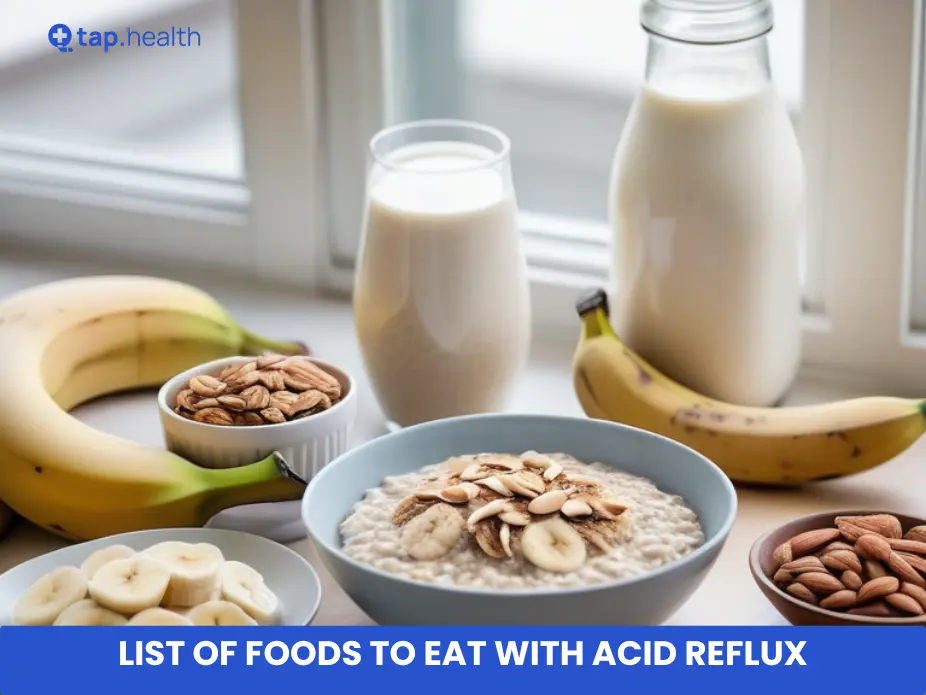Dealing with acid reflux, also known as gastroesophageal reflux disease (GERD), involves more than just taking medication. The foods you eat play a significant role in managing and preventing symptoms. This comprehensive guide will cover foods to avoid, foods that are beneficial, best eating habits, when to seek medical advice, and frequently asked questions.
Foods That May Cause Heartburn
Understanding which foods can trigger heartburn is essential for managing acid reflux. Here are some common culprits:
1. Spicy Foods
Spicy foods can irritate the lining of the esophagus and increase acid production, leading to heartburn. Ingredients such as chili powder, hot sauce, and black pepper can exacerbate symptoms.
2. Citrus Fruits
Citrus fruits like oranges, lemons, and grapefruits are highly acidic and can worsen acid reflux symptoms. The high acid content can irritate the esophagus and cause discomfort.
3. Tomatoes and Tomato-Based Products
Tomatoes are naturally acidic and can trigger heartburn. This includes fresh tomatoes, tomato sauce, ketchup, and salsa. These products can relax the lower esophageal sphincter (LES) and allow stomach acid to escape into the esophagus.
4. Chocolate
Chocolate contains caffeine and theobromine, which can relax the LES and allow acid to escape. Additionally, chocolate can stimulate acid production, making symptoms worse.
5. Caffeinated Beverages
Drinks such as coffee, tea, and soda contain caffeine, which can increase stomach acid production. These beverages can also relax the LES, leading to acid reflux.
6. Alcohol
Alcohol can relax the LES and increase acid production. Beer, wine, and liquor are known to trigger heartburn and should be consumed in moderation or avoided altogether.
7. Fatty Foods
High-fat foods such as fried foods, full-fat dairy products, and fatty cuts of meat can slow down digestion and increase the risk of acid reflux. Fatty foods can relax the LES and cause stomach acid to back up into the esophagus.
8. Onions and Garlic
Onions and garlic can cause heartburn, especially when eaten raw. These foods can relax the LES and increase acid production, leading to discomfort.
9. Carbonated Beverages
Sodas and other carbonated drinks can cause bloating and increase pressure on the LES, leading to acid reflux. The bubbles in these drinks can expand in the stomach and push acid into the esophagus.
10. Mint
While mint is often thought to soothe the stomach, it can actually relax the LES and worsen acid reflux symptoms. Peppermint and spearmint should be avoided if you suffer from GERD.
20 Foods to Eat with Acid Reflux
While many foods can trigger acid reflux, there are plenty of foods that can help manage symptoms. These foods are generally low in acid and can help soothe the digestive tract.
1. Bananas
Bananas are low in acid and can help neutralize stomach acid. They are also high in fiber, which can aid digestion.
2. Melons
Melons such as cantaloupe, honeydew, and watermelon are low in acid and can help prevent acid reflux. They are also hydrating and can help soothe the digestive tract.
3. Oatmeal
Oatmeal is a great breakfast option for those with acid reflux. It is high in fiber and can help absorb stomach acid. Oatmeal can also keep you full, reducing the likelihood of overeating, which can trigger acid reflux.
4. Green Vegetables
Green vegetables such as spinach, kale, and broccoli are low in acid and can help reduce symptoms of acid reflux. They are also high in fiber and other nutrients that promote digestive health.
5. Ginger
Ginger has natural anti-inflammatory properties and can help soothe the digestive tract. It can be consumed as tea, added to meals, or taken as a supplement to help manage acid reflux.
6. Whole Grains
Whole grains such as brown rice, quinoa, and whole wheat bread are high in fiber and can help absorb stomach acid. They also promote healthy digestion and can prevent acid reflux.
7. Lean Proteins
Lean proteins such as chicken, turkey, and fish are low in fat and can help prevent acid reflux. These proteins are easier to digest and less likely to trigger symptoms.
8. Potatoes
Potatoes, including sweet potatoes, are low in acid and can help neutralize stomach acid. They are also high in fiber and can promote healthy digestion.
9. Couscous
Couscous is a low-acid grain that can be a good addition to an acid reflux-friendly diet. It is easy to digest and can be paired with lean proteins and vegetables.
10. Fennel
Fennel has natural soothing properties and can help reduce symptoms of acid reflux. It can be eaten raw, cooked, or as a tea to help manage symptoms.
11. Almonds
Almonds are a good source of healthy fats and can help neutralize stomach acid. They should be eaten in moderation as part of a balanced diet.
12. Apples
Apples, especially the sweeter varieties, are low in acid and can help reduce symptoms of acid reflux. They are also high in fiber and can promote healthy digestion.
13. Celery
Celery is low in acid and high in water content, making it a great choice for those with acid reflux. It can help neutralize stomach acid and promote healthy digestion.
14. Carrots
Carrots are low in acid and high in fiber, making them a good choice for an acid reflux-friendly diet. They can be eaten raw, cooked, or as part of a meal to help manage symptoms.
15. Parsley
Parsley has natural soothing properties and can help reduce symptoms of acid reflux. It can be added to meals or consumed as a tea to help manage symptoms.
16. Chamomile Tea
Chamomile tea has natural anti-inflammatory properties and can help soothe the digestive tract. It can be consumed before bed to help prevent nighttime acid reflux.
17. Egg Whites
Egg whites are low in fat and can be a good source of protein for those with acid reflux. They are easy to digest and less likely to trigger symptoms compared to whole eggs.
18. Lean Beef
Lean cuts of beef, such as sirloin or tenderloin, can be part of an acid reflux-friendly diet. These cuts are lower in fat and easier to digest.
19. Salmon
Salmon is a good source of healthy fats and protein. It is also low in acid and can help reduce symptoms of acid reflux. Baking or grilling salmon is a better option than frying.
20. Herbal Teas
Herbal teas such as licorice, slippery elm, and marshmallow root can help soothe the digestive tract and reduce symptoms of acid reflux. These teas can be consumed throughout the day to help manage symptoms.
Best GERD Eating Habits
In addition to choosing the right foods, adopting healthy eating habits can help manage and prevent acid reflux symptoms. Here are some tips to keep in mind:
1. Eat Smaller, More Frequent Meals
Eating large meals can put pressure on the LES and increase the risk of acid reflux. Instead, try eating smaller, more frequent meals throughout the day. This can help keep your stomach from becoming too full and reduce the likelihood of acid reflux.
2. Avoid Eating Late at Night
Eating close to bedtime can increase the risk of acid reflux. Try to finish your last meal at least three hours before going to bed. This gives your body enough time to digest the food and reduce the likelihood of acid reflux while you sleep.
3. Stay Upright After Eating
Lying down immediately after eating can increase the risk of acid reflux. Try to stay upright for at least two to three hours after eating to help prevent stomach acid from flowing back into the esophagus.
4. Chew Food Thoroughly
Chewing your food thoroughly can help with digestion and reduce the risk of acid reflux. Take your time when eating and make sure to chew each bite thoroughly before swallowing.
5. Avoid Tight Clothing
Wearing tight clothing can put pressure on the stomach and increase the risk of acid reflux. Opt for loose-fitting clothing, especially around the waist, to help prevent symptoms.
6. Elevate the Head of Your Bed
Elevating the head of your bed by 6 to 8 inches can help prevent acid reflux while you sleep. This can be done by placing blocks under the legs of the bed or using a wedge pillow to elevate your upper body.
7. Maintain a Healthy Weight
Being overweight can increase the risk of acid reflux. Maintaining a healthy weight through diet and exercise can help reduce symptoms and improve overall health.
8. Avoid Triggers
Identify and avoid foods and drinks that trigger your acid reflux symptoms. This can vary from person to person, so keeping a food diary can help you identify your specific triggers.
9. Drink Water
Drinking water can help dilute stomach acid and promote healthy digestion. Try to drink water throughout the day, especially after meals, to help manage acid reflux symptoms.
10. Practice Relaxation Techniques
Stress can increase the risk of acid reflux. Practice relaxation techniques such as deep breathing, meditation, or yoga to help manage stress and reduce symptoms.
When to Seek Medical Advice
While lifestyle changes and dietary modifications can help manage acid reflux, it is important to know when to seek medical advice. Here are some signs that you should consult a healthcare professional:
1. Frequent Heartburn
If you experience heartburn more than twice a week, it is important to seek medical advice. Frequent heartburn can be a sign of GERD and may require treatment.
2. Difficulty Swallowing
If you have difficulty swallowing or feel like food is getting stuck in your throat, it is important to seek medical advice. This can be a sign of esophageal damage or other complications of acid reflux.
3. Persistent Cough or Hoarseness
A persistent cough or hoarseness can be a sign of acid reflux. If you experience these symptoms for an extended period of time, it is important to seek medical advice.
4. Chest Pain
Chest pain can be a sign of acid reflux, but it can also be a sign of a more serious condition such as a heart attack. If you experience chest pain, it is important to seek medical advice immediately.
5. Unexplained Weight Loss
Unexplained weight loss can be a sign of a serious condition and should be evaluated by a healthcare professional. If you experience unexplained weight loss along with acid reflux symptoms, it is important to seek medical advice.
FAQ on List of Foods to Eat with Acid Reflux
1. What foods are safe to eat with acid reflux?
Foods that are generally safe to eat with acid reflux include bananas, melons, oatmeal, green vegetables, ginger, whole grains, lean proteins, potatoes, couscous, fennel, almonds, apples, celery, carrots, parsley, chamomile tea, egg whites, lean beef, salmon, and herbal teas.
2. What foods should I avoid if I have acid reflux?
Foods to avoid if you have acid reflux include spicy foods, citrus fruits, tomatoes and tomato-based products, chocolate, caffeinated beverages, alcohol, fatty foods, onions and garlic, carbonated beverages, and mint.
3. Can lifestyle changes help manage acid reflux?
Yes, lifestyle changes such as eating smaller, more frequent meals, avoiding eating late at night, staying upright after eating, chewing food thoroughly, avoiding tight clothing, elevating the head of your bed, maintaining a healthy weight, avoiding triggers, drinking water, and practicing relaxation techniques can help manage acid reflux.
4. When should I seek medical advice for acid reflux?
You should seek medical advice if you experience frequent heartburn, difficulty swallowing, persistent cough or hoarseness, chest pain, or unexplained weight loss.
5. Are there any natural remedies for acid reflux?
Yes, natural remedies for acid reflux include consuming ginger, chamomile tea, fennel, and almonds. These foods have natural soothing properties and can help manage symptoms of acid reflux.
Managing acid reflux involves a combination of dietary changes, lifestyle modifications, and, in some cases, medical treatment. By understanding which foods to eat and which to avoid, you can help reduce symptoms and improve your quality of life.



